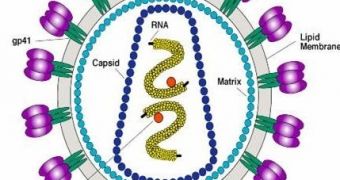In the race for an anti-HIV vaccine, scientists have just opened another chapter, discovering the molecular mechanisms that make a few antibodies effective against HIV, while most of them fail.
Vaccines have been fighting for long successfully against many infectious diseases, but scientists still do not know how exactly they act and trigger the body's antibodies to neutralize a germ.
"This study is part of the effort to understand how protection against HIV occurs. If we really understand this, then we can design tailor-made vaccines in a way that has never been done before." said Dennis Burton, a professor at The Scripps Research Institute.
Burton's team focused on the b12 antibody, one of the few antibodies effective against HIV, detected in 1992 at Scripps in the bone marrow of a 31-year-old male who carried HIV for six years without symptoms. Now, the scientists engineered mutated types of b12 to observe how various changes affected the antibody's effectiveness.
"Hopefully, we can work backwards towards a vaccine, using b12 and the very few other really great, broadly neutralizing antibodies against HIV that have been found," said first author Ann Hessell, Scripps Research Senior Research Associate. The antibody's effect was linked both to its ability to bind to HIV and to interact with immune cell Fc receptors, located on the immune cells, like natural killer cells. The Fc receptor connects to the Fc region of an antibody after an antibody binds to a pathogen, targeting the germ for attack by the immune cells.
This is the first time when Fc receptor has been proved to be involved in the anti-HIV fight.
The team investigated the power of two mutated variants of b12, called KA and LALA, employing the SHIV/macaque model, in which the monkeys were infected with a hybrid human-monkey virus that infects the monkey (monkeys are immune to SHIV or monkey's HIV) but is recognized by human antibodies.
The KA variant had a mutation that impeded it from interacting with the complement cascade, a main part of the immune system determining the killing of the invading pathogens, while LALA's mutation impeded both the interactions with either the complement pathway or the Fc receptor.
The both mutant antibodies could attach to free virus, so that team could specifically see the importance of the complement cascade and Fc receptor system for impeding infection.
"We saw that the KA antibody, which could still bind to the Fc receptors on the immune cells but not to the complement cascade, protected the animals from becoming infected just as the wild type b12 antibody. In contrast, the LALA group became infected much like the controls." said Hessell.
This is the first proof that the Fc receptor, but not the complement cascade, is crucial for b12 in fighting HIV.
Supplementary tests showed that b12 and KA antibodies, but not the LALA antibody, were stronger in impeding infection in the presence of killer cells of the immune system.
"Our results are fully consistent with the antibody doing two jobs: job one, stick to the virus; job two, recruit immune cells to come and kill infected cells." said Burton.

 14 DAY TRIAL //
14 DAY TRIAL //